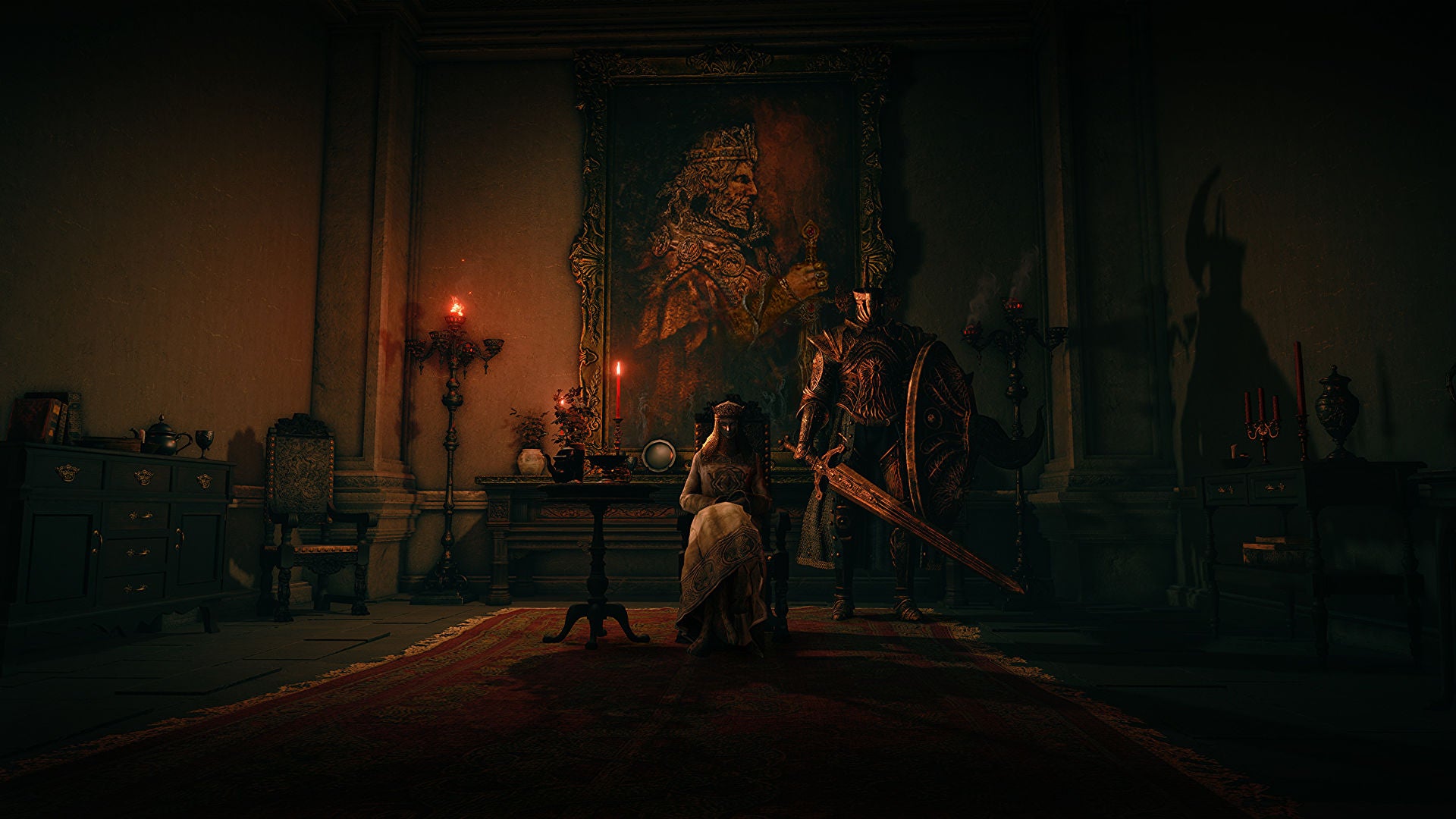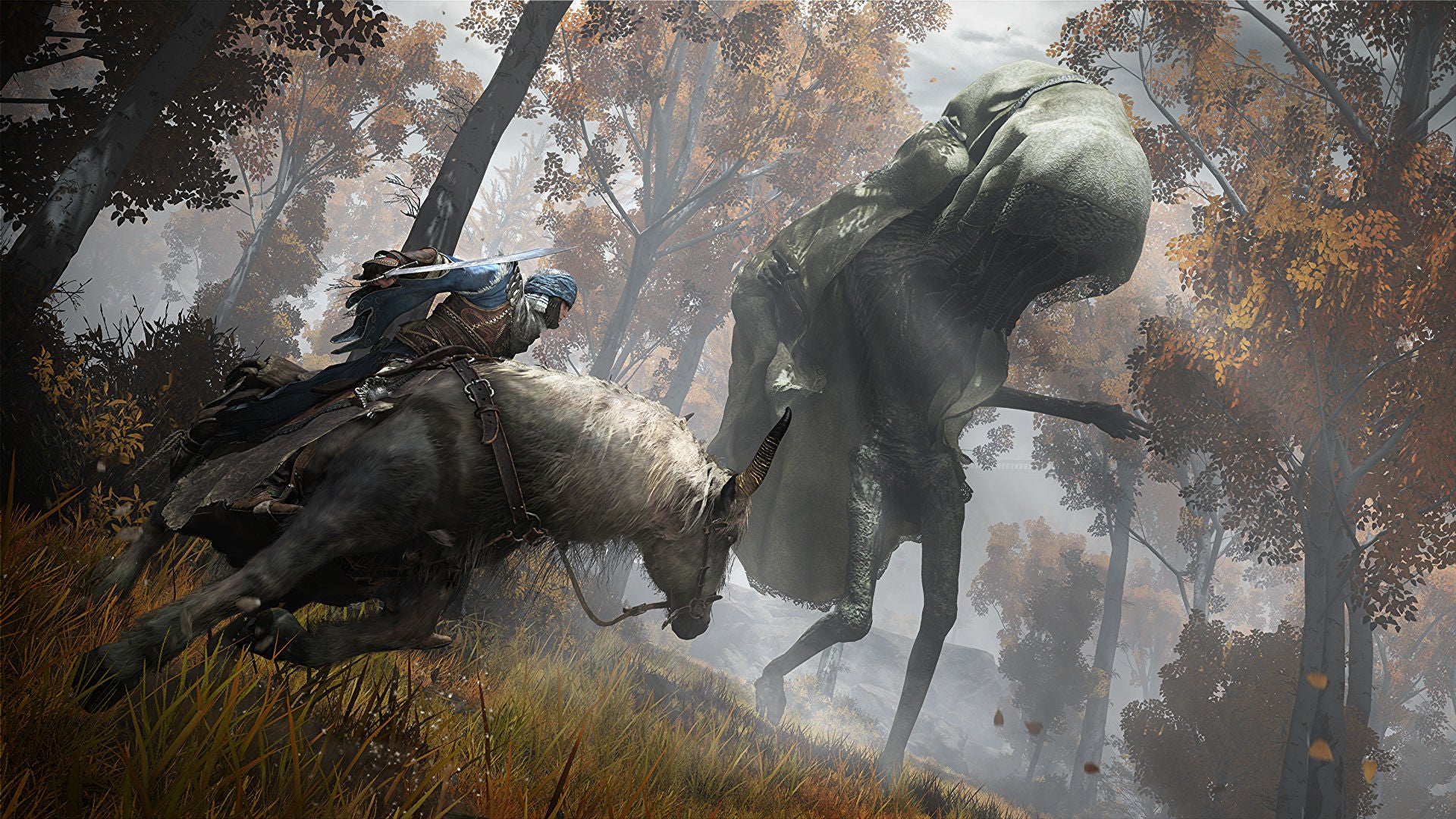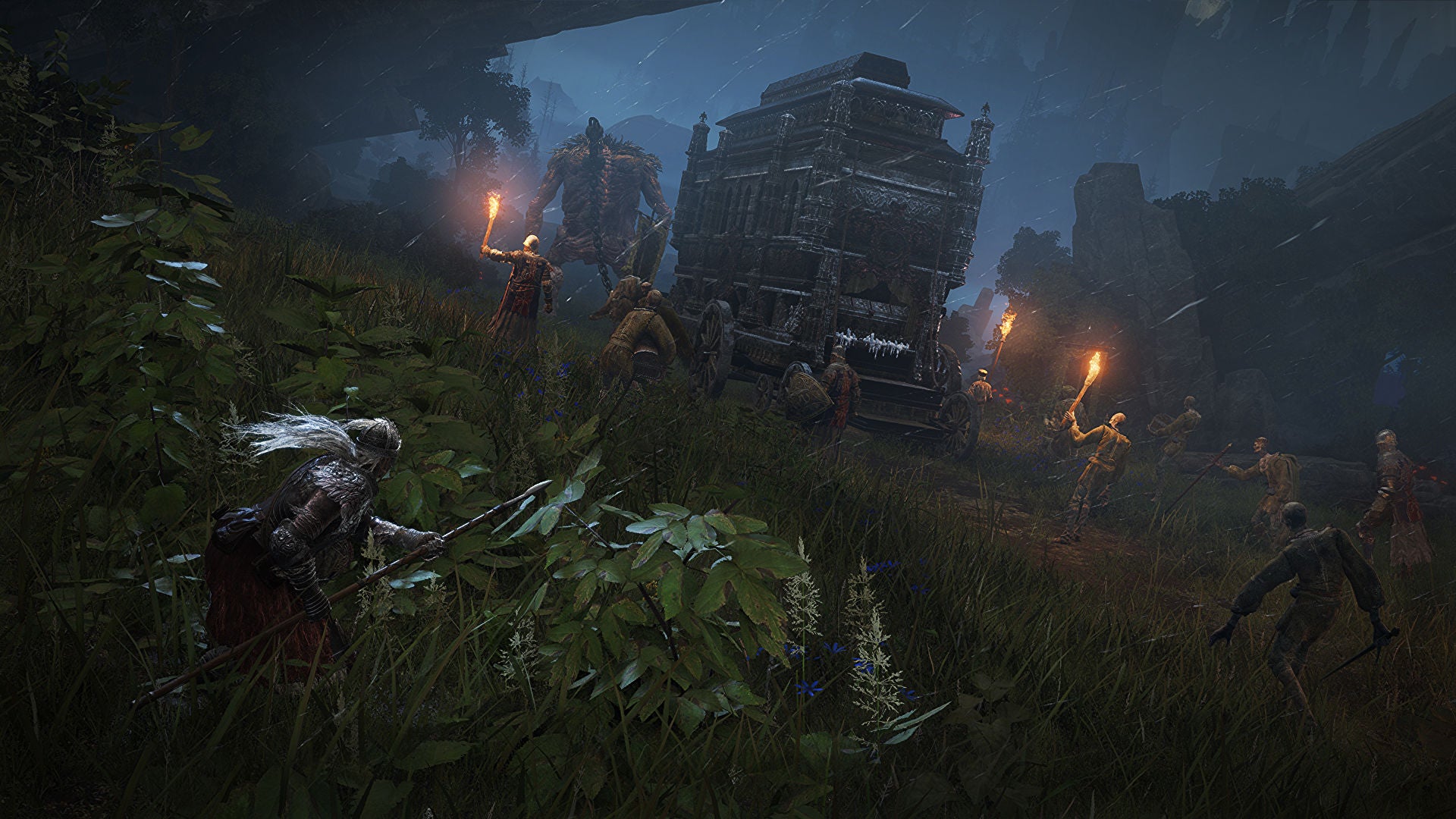Unlike the Closed Network Test that allowed a number of lucky individuals to trial some early areas of the game back in November 2021 with five pre-selected and pre-buffed builds, this latest - and last - Elden Ring preview allowed us to choose from any of the ten starting builds that will likely be present in the final game. These are: Prisoner, Samurai, Prophet, Astrologer, Bandit, Hero, Warrior, Vagabond, Wretch and Confessor. The Wretch is your typical naked but for a loincloth avatar, who has a starting skill of 10 in pretty much every stat. The Confessor and Prophet are your high faith builds, while Astrologer is the high intelligence caster of the lot. Vagabond has decent vigor and strength, while the Samurai prioritises higher dexterity, endurance and strength. Hero would seem to be the obvious starting choice for pure melee builds. But do remember, all of these exist solely to give you a small head-start on levelling and equipment - as you progress through the game you can spend runes (Elden Ring’s version of souls) to improve any skill as you see fit and create characters that complement your own playstyle. I went with Astrologer, but over the course of playing spent a few points in strength as well as intelligence, so that I could switch between a staff or a sword if the occasion called for it. My build ended up resembling the Enchanted Knight class that appeared in the Closed Network test, minus the fancy armour set and a few of their later spells. Because, be warned if you did partake in the Closed Beta and were hoping to retrace your steps in the main game - things are different here. If you thought Elden Ring was going to be easier based off of that early look, think again - items have been switched around or moved, bosses drop different items, and any armour or weapons or Ashes of War that you grew quite attached to? You can bet you won’t get your hands on those for a while yet. Some NPCs and collectable summons have moved around as well, and some brand new characters have turned up to grant you tidbits of lore or tips along the way. They’re necessary changes that keep things fresh and challenging for these first stages of the game, though that’s not to say it doesn’t take a bit of adjustment. The preview kicked off at the very beginning of Elden Ring, including character customisation and the voiced introduction to FromSoft’s new world. Character customisation included choosing a gift - these ranged from golden seeds, cracked pots and Stonesword keys, to a boiled prawn. As for the intro, it’s unclear whether this is a final version - it covers the shattering of the Elden Ring in the Lands Between, how this event seemingly caused Queen Marika the Eternal to vanish, and how in an event called the Night of the Black Knives, Godwyn the Golden was first to perish. Marika’s children, demigods all, claimed the shards of the Elden Ring and triggered a war where no winners emerged. The Tarnished, dead who yet live, follow the call of grace now long lost and seek to become an Elden Lord. But of course they aren’t the only ones, and the intro names many characters who will doubtless turn out to be boss battles or ill-fated NPCs. Maybe even both. There’s Hoarah Loux, chieftain of the Badlands, Goldmask, Fia the Deathbed Companion, the ’loathsome’ Dung Eater, and Sir Gideon Ofnir, the All-Knowing. An intriguing bunch for sure… After the intro you’re deposited in the appropriately named Chapel of Anticipation. It’s a classic FromSoft gambit whereby you’re allowed a little bit of an explore before dying to a powerful foe. This one had multiple limbs and resembled the creature players fought behind a closed door in Stormveil castle in the closed beta, to receive a rusty key. Once you’ve been hastily dispatched, you awake in the same crypt from the beta, where you can complete the optional tutorial before eventually emerging in Limgrave. From here, a lot of my starting steps were similar to those in the beta for the purposes of levelling up and grabbing some decent gear. One notable change right from the off though was how summons are now slightly more difficult to obtain, and can only be used once visited by a mysterious Snow Witch in the Church of Elleh, who gifted us the Spirit Bell. There’s a new NPC at the abandoned shack on the Stormveil castle approach who told us that all of their companions had been slaughtered and their limbs - legs, arms, heads - had all been grafted for use by the castle lord, Godrick. Grafting, it would soon become clear after actually entering the castle, is a bit of a theme there. Before retreading those steps though, there’s an opportunity for some exploration. Journeying south, beyond Agheel Lake and some hostile encampments, there’s the so-called Weeping Peninsula, accessed via an enigmatically named Sacrificial Bridge. On the forlorn landscape of the peninsula, you’ll find poisoned swamps (a Miyazaki specialty of course), and small, wandering, chimera-like beasts who almost look like they might have been human once. Further down that path there’s Castle Morne. Here, in a great courtyard, lies a vast pile of burning bodies, surrounded by more of those winged creatures. There’s also a hidden site of grace behind the castle where some tougher enemies are guarding treasure. Within is another NPC encounter that can play out one of several ways, though once this is done we couldn’t actually find anywhere else to explore in Castle Morne, though whether that’s because of this particular build or perhaps because of where we were relatively early on in Elden Ring’s story, we don’t know. After you’ve explored Limgrave and proven yourself to Melina, the mysterious woman who levels you up in return for runes, she’ll whisk you off to the Roundtable Hold, a safehaven existing somewhere outside of the world that can only be reached via sites of grace or selecting its icon on the overworld map. The Roundtable Hold is where Tarnished gather, and on entering for the first time you’re instructed that there’s a strict pact of non-aggression in effect, so combat is prohibited. The quiet hub is filled with NPCs to talk to, so this rule may exist solely to protect them, but we did wonder if other players could co-exist with you here too. As for those NPCs, these include a prophet that will teach you faith-based spells, a Blacksmith curiously imprisoned here and made to toils away upgrading or crafting equipment for Tarnished, and a few other colourful characters, some useful and some ominously silent. Perhaps the most interesting though is Fia, the Deathbed Companion, who was mentioned in the opening to the game. She tells you that where she comes from, it’s her custom and duty to lie with and hold those close to death - interpret that how you will. She’s got a lot of fascinating backstory though, and will offer to hold you as often as you like - this will bestow a temporary blessing on you though we aren’t entirely sure what exactly it buffs. At any rate, it’s just nice to have someone give you a hug in a world so relentlessly hostile. In Fia’s room you’ll also find a dressing table that allows you to re-enter the character creation screen and essentially customise your appearance however you like, as often as you’d like. It’ll be fascinating to see if and how Fia’s story deepens as the game progresses. Back in the overworld, we journeyed into the east of Stormveil Castle, beyond the riders and bandit encampments to find a relatively serene meadow, where in the midst of fighting off a small band of Demi-humans there was someone calling for help. This person, standing atop some ruins, introduced himself as Kenneth Haight, claiming to be royalty driven from his castle. He promised us all sorts of rewards should we help him regain his throne, but there was something just a little off about Kenneth - he’s someone to keep an eye on in the final game for sure. Journeying into the woods near the meadow are some absolutely gigantic bears. Some players managed to reach one of these enemies in the demo, and a few mistakenly referred to it as a mini-boss. It isn’t - there are several wandering around the woods and all are stacked and utterly deadly. So, we did what any under-leveled player with a serious time restriction would do and ran away. Not far from the bears, though, is an initially unassuming domed building with nothing inside but a lift. Pulling its lever sent us underground - very, very far underground. So far, in fact, that we began to wonder if the lift would ever stop. But it did, and deposited us in a gorgeous purple and blue-hued landscape beneath the Siofra River. This whole subterranean area was vast, and initially populated only by a large number of very slow-moving but hard-hitting humanoids. We eventually came upon some grandiose ruins where something resembling a huge undead stag lay motionless - though perhaps there’s a way to change that. We know a potential FromSoft boss arena when we see one. Back on the surface, there were a few other things we discovered. Far to the south, we found a place called the Tower of Return. There wasn’t much there save for a few basic enemies, but climbing to the top of the tower we found a chest. After doing the obligatory hit-it-once-in-case-it’s-a-mimic (hey, old habits die hard), it opens up and informs us that it was after all a trap and we’re being teleported…somewhere. A few seconds later, we reappear in a beautiful stone courtyard, where golden leaves are falling all around us. This is Leyndell, the royal capital. Checking on the map screen, we are indeed still inside the Lands Between but far, far, far to the north of Limgrave. There’s a site of grace here and some stone steps that lead to a fight with a giant golem, who crushes us to powder despite repeated attempts at combat. There are a few chests to loot around the area though, so not a totally lost trip before we use the site of grace to travel back to Limgrave. That golem will be defeated another day. There’s another boss at the foot of one of the many golden trees scattered about Limgrave. The approach is marked by multiple twisted plant-like creatures, and underneath the tree itself are a huge scattering of large broken pots, surrounding a foe named the Erdtree Avatar - a gnarled tree-like monstrosity that came at us fast and aggressively. It was a fairly tough fight helped along with a summon, and the rewards were items that could be mixed in our Flask of Wondrous Physick to produce different buffs and effects. There didn’t seem to be any big worldly change to defeating this boss, but it is marked on the map with a golden ‘Minor Erdtree’ symbol. Finally, beyond Margit the Fell Omen at the entrance to Stormveil Castle, there’s a quiet path around the outside of the structure to reach the door formerly locked with the rusty key. The many-limbed beast that previously dropped it is now replaced with a heavily-armoured guard, but the technique to defeating them is much the same. From here there’s the ladder that formerly signalled the end of the demo in the closed network test, and finally the ramparts above, where eagles with knives on their feet are flinging exploding barrels around. It’s a tough area given how large it was - we were ducking and fighting around lots of guards, through great halls where bodies and limbs were strewn and hung, no doubt for the grafting processes we’d heard so much about. In a small chapel tucked away from any immediate danger, there’s a sorcerer who could teach us some spells (for a price), but shortly after venturing a little deeper and falling foul to more guard patrols, our time with Elden Ring was sadly up. Six hours isn’t nearly enough time with this game, even taking into account the 20 hours we’d sunk into the closed beta. The great (and terrible) thing that strikes you is the freedom - sites of grace give off a golden trail that subtly points you towards a next objective, but you can completely ignore that and strike out in whatever direction you want. It’s impressive when you think about how FromSoftware must consider how every player might pace themselves as they each explore the map in their own way, and yet how progression still feels entirely up to you. And that’s frightening in itself, given how danger lurks everywhere, even in the least expected places. Will you take a chance and reach out and touch a mysterious mirror you find, or a suspicious stone tablet? Will you risk it all to open that chest, not knowing if it may mean your sudden doom? Mistrust of random inanimate objects aside, Elden Ring feels freeing in ways From Software games haven’t before, perhaps in part due to fear of the unknown, but also, fear of the great unknown expanse that lies before you. if you’re struggling with a particular area or boss, simply fast-travel or summon Torrent and ride your way out of there, and find a myriad other directions you can explore in. I might have felt pressure during a timed preview, but this will surely feel extremely freeing in the final game, when you can take things at your own pace, go your own route, indulge in the freedom that this jagged, ragged open world offers you. There’s difficulty and challenge here, yes, but there’s also the promise that you can and will overcome it, however you wish. Freedom. Great and terrible freedom.


